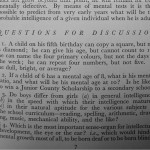 The BBC produced adult education television and radio programmes prior to the creation of the OU and it also produced written materials to accompany many of these programmes. One series, aimed at farmers, was broadcast in 1968. The Agricultural Producer at the BBC explained that each programme was clearly structured, sometimes the same film was shown twice in order to explain points but that every attempt was made not to patronize. (see Educational Television International, 2, ,2, June 1968, pp122-126. The booklet, pictured, was free on request and for those farmers who gathered to watch together there were also Tutor Notes which provided both additional background material and suggested topics for discussion.
The BBC produced adult education television and radio programmes prior to the creation of the OU and it also produced written materials to accompany many of these programmes. One series, aimed at farmers, was broadcast in 1968. The Agricultural Producer at the BBC explained that each programme was clearly structured, sometimes the same film was shown twice in order to explain points but that every attempt was made not to patronize. (see Educational Television International, 2, ,2, June 1968, pp122-126. The booklet, pictured, was free on request and for those farmers who gathered to watch together there were also Tutor Notes which provided both additional background material and suggested topics for discussion.

The advertisement for a commercial television company (‘Look I’m five teachers’) dates from January 1969 and illustrates one of the cases made for the use of television for educational purposes.
This medium had long been conceptualised as of significance (in 1960 William Benton, one of those who played an important part in the OU’s foundation) said that it ‘could be the greatest force ever known to deepen our understanding and broaden our knowledge’ (W Benton, Television – a prescription: a national citizens’ advisory board, Vital speeches of the day, 26, 18, pp. 571-574, (p 572).
Certainly television helped secure the OU as part of the popular heritage of the UK. Much of the popular affection for the OU might well be due to the use of television for its broadcasts during a period when there were few channels available to UK residents. When Sheila Grant studied in the popular soap Brookside it was with the OU (and yes she was accused of having an affair with her tutor) and when in Life on Mars the central character receives comforting but complicated messages from across time and space, it was via late-night 1970s Open University programmes.







